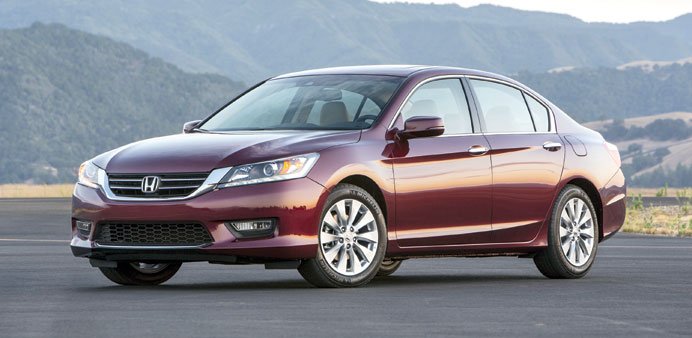Honda shrank the 2013 Accord back into the heart of the midsize segment. A new engine and transmission also restored its accustomed status as a fuel-economy leader.
By Mark Phelan
It’s not exactly back to the future, but at a minimum, the 2013 Accord midsize sedan takes Honda back to before 2008. That was when Honda introduced the last version of the Accord, and that was when one of America’s favourite midsize sedans lost its way.
Bloated and uncompetitive, the 2008 Accord trailed its competitors’ technology and fuel economy. After decades as a customer and critical favourite for its value, performance and efficiency, the Accord was suddenly mediocre.
Honda right-sized the Accord for 2013, shrinking the car back into the heart of the midsize segment. A new engine and transmission also restore its accustomed status as a fuel-economy leader.
Honda builds a wide range of Accord models. Prices for the sedan start at $21,680 for one with a new direct-injected 185-horsepower 2.4-litre four-cylinder engine and a six-speed manual transmission.
The only automatic transmission available with that engine is a smooth new continuously variable unit. In the US, the least expensive Accord sedan with the CVT automatic starts at $22,480. US base prices for four-cylinder Accords extend to $29,995.
The Accord also has a 278-horsepower V-6 teamed with a conventional six-speed automatic gearbox. Prices for a V-6 Accord sedan start at $30,070 and extend to $33,430 for the top-of-the-line V-6 Touring model.
I tested a four-cylinder Accord EX sedan that’s nearly dead in the middle of the model line. The nicely equipped car I tested had no options and stickered at $25,405. All prices exclude destination charges.
Honda also builds an Accord coupe. It comes with the same engine and transmission choices. Prices range from $23,350 to $32,350.
Hybrid and plug-in hybrid models of the Accord sedan should go on sale this summer. Prices for the plug-in will start at $39,780.
That broad model line notwithstanding, cars like the four-cylinder EX will comprise the great majority of Accord sedan sales. It competes with similarly priced versions of the Malibu, Fusion, Sonata, Optima, Camry and Passat.
The 2.4-litre provides good acceleration and throttle response. The engine gets buzzy at high rpm, but road and wind noise are fine.
The Accord is quiet, comfortable and acceptably responsive. The steering felt a bit vague and road holding may not match the Altima, Fusion and Malibu, but the suspension absorbs bumps smoothly.
The Accord sedan’s strengths are passenger room and fuel economy. The interior is comfortable and accommodating, with good head, leg and shoulder room in the front and rear seats.
The interior features soft-touch surfaces. The speedometer and tachometer are large and easy to read.
A couple of glitches marred the car I tested. The latch on the sunglasses holder in the headliner worked poorly, sometimes refusing to open or close.
The voice-recognition system for hands-free phones requires more steps than the best competitors. The USB input is rather inconveniently located in the bottom of the centre stack.
The Accord’s biggest innovation is an unusual approach to blind-spot alert. Just about every automaker with a blind-spot alert uses a flashing light, and in some cases a chime, to let drivers know when somebody’s in their blind spot on the right or left side of the car.
Honda took a different — and I think inferior — approach. Called Lane Watch, it displays an image of the two lanes to the right and behind the car on a video screen located in the centre stack, near the radio and climate controls.
I found it ineffective and distracting. Unlike other automakers’ systems that use sensors to tell you when a vehicle is in your blind spot, it operates only when you use the indicator for a right turn or lane change. There’s no warning when you need it most — when somebody’s in the blind spot and you forget to indicate a lane change. The screen also lights up every time you use the right indicator, creating a new distraction by demanding your attention regardless of whether it has any information you need. It’s a poor system.
The Accord four-cylinder’s fuel economy, on the other hand, is very good. Excluding more expensive models that use hybrid technology to reduce fuel consumption, its EPA combined city and highway fuel economy rating of 30 mpg beats every competitive midsize sedan except the Nissan Altima.
Honda’s trip back to the future may not be a blockbuster, but fire up the flux capacitor. This sequel is worth a look. — Detroit Free Press/MCT
* (Technical specifications may vary in locally available models).
In a nutshell
* Type of vehicle: Front-wheel drive five-passenger premium midsize sedan
* Reasons to buy: Fuel economy, interior room, price
* Shortcomings: Vague steering, latch on sunglasses holder, blind-spot alert, voice recognition
* Base price, base model (in US): $21,680

